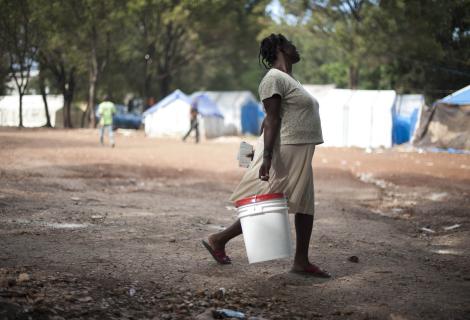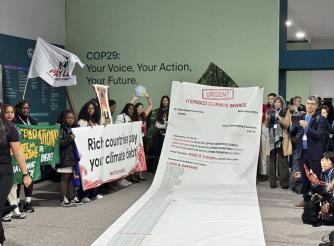Climate crisis to blame for high rates of cholera, says ActionAid

The charity says outbreaks in Malawi and Haiti illustrate how climate change will increase the risk of cholera around the world.
After years of declining cholera cases, ActionAid has become increasingly concerned about the ‘worrying upsurge’ of deadly outbreaks which have emerged across the world over the past year – including in 27 countries since January. Malawi, Haiti, Syria, and Somalia are all facing outbreaks, with millions of people under threat of the disease.
The charity is particularly worried that extreme climate events like floods, cyclones, and droughts further reduce access to clean water and create the ideal environment for cholera to spread.
In Syria, more than 10,000 suspected cases of cholera have been reported just in the past six weeks. And in Haiti, after more than three years with no cases of cholera, 35 deaths have been officially reported with around 50 confirmed cases.
In Malawi, the risk is high with more than 4,300 cases and around 120 deaths since the onset. The Ministry of Health declared a cholera outbreak in Malawi on 3 March this year after a case was found in the country.
Initially in Malawi, the outbreak was affecting districts that were vulnerable to Tropical Storm Ana and Tropical Cyclone Gombe in the southern region. The current outbreak is unexpected, spreading to districts in central and northern regions that have not experienced cholera in over a decade.
Pamela Kuwali, ActionAid Malawi Executive Director, said: “The cholera outbreak has significantly disrupted the delivery of health services in Malawi which is still struggling with the impact of the COVID-19 pandemic. Like any other emergency, the cholera outbreak has disproportionately affected women and girls, increasing the unpaid care work burden as they support those affected.
“We urge the Malawi government and all non-state actors to rise to the emergency by ensuring that care, treatment, and preventive measures reach all at risk of the outbreak.
“We call upon government to increase investment in gender-responsive services such as clean and portable water and other sanitation-related facilities in communities as a long-term solution to the outbreak.”
These outbreaks are happening in regions where there haven’t been any occurrences in a while (three years in Haiti, and more than a decade in some countries like Syria and Malawi).
In Somalia prolonged drought continues to destroy lives and livelihoods devastating a large portion of Somali populations with millions feared to be sliding into famine. Millions of people are facing acute water shortages with most of the surface water and a significant number of shallow wells becoming dry. Consequently, limited access to safe drinking water has triggered a spike in cholera incidences.
In Haiti, some cases are occurring in inaccessible areas controlled by armed gangs. The displaced populations remained with no access to safe drinking water and sanitation facilities and thus, were at risk of widespread disease outbreaks including cholera.
Teresa Anderson, global lead for climate justice at ActionAid, said: “Families who are already facing hunger due to drought are now suffering from cholera outbreaks as their water sources dry up. The tragedy and injustice of climate change means that communities suffering crisis upon crisis are those that have done the least to contribute to the problem.”
The outbreaks in the communities are generally associated with poor food hygiene, poor sanitation, and hygiene including low latrine coverage and challenges with water treatment. Cholera, which is transmitted through contaminated water, is highly treatable and preventable. There are effective vaccines and antibiotics, and often simple interventions such as oral rehydration are sufficient to save lives. Yet it can kill in a matter of hours without access to these lifesaving measures, especially clean water.
Most countries are still grappling with the COVID-19 pandemic and the cholera outbreak has further overwhelmed the available hospitals.
ENDS
To contact the ActionAid press office email media-enquiries@actionaid.org.uk.
Notes to Editor
About ActionAid
ActionAid is a global federation working with more than 15 million people living in more than 40 of the world’s poorest countries. We want to see a just, fair, and sustainable world, in which everybody enjoys the right to a life of dignity, and freedom from poverty and oppression. We work to achieve social justice and gender equality and to eradicate poverty.

